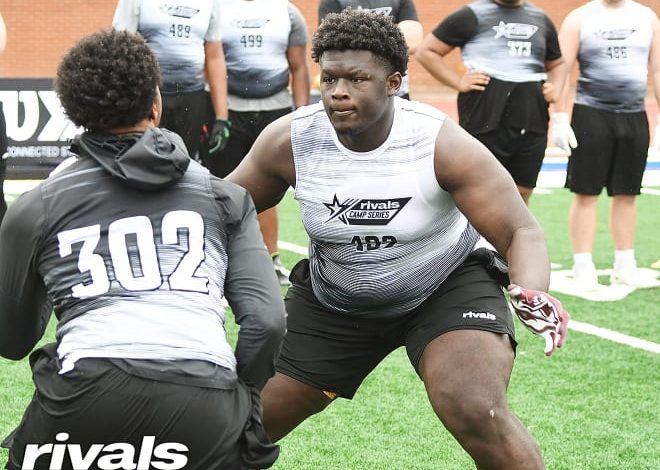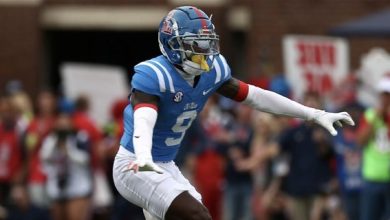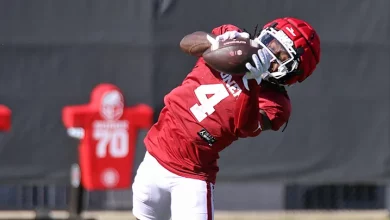Tennessee Volunteers Decommit Brandon Anderson

In the world of college football recruiting, few events stir the pot as much as a highly rated prospect decommitting from a program. The ripple effects are felt not only by the team losing the commitment but also by the prospect, the recruiting world, and the fans who have invested so much in the future of their team. The recent news of Brandon Anderson—a four-star recruit—decommitting from the Tennessee Volunteers has sent shockwaves through the Tennessee football community and the broader college football recruiting world. Anderson’s decision to back away from his commitment raises important questions about the dynamics of college football recruiting, Tennessee’s future plans, and how this shift could impact both the Volunteers’ recruiting class and Anderson’s future.
In this article, we’ll take an in-depth look at the reasons behind Anderson’s decommitment, what it means for Tennessee, and how this event may influence the landscape of college football recruiting moving forward. Additionally, we will explore the recruiting strategy of Tennessee head coach Josh Heupel, and how this development could potentially affect the future of the Volunteers’ program.
Who is Brandon Anderson?
Before delving into the implications of Anderson’s decommitment, it’s important to understand who he is as a player and why his commitment to Tennessee was such a significant event.
Brandon Anderson is a highly touted prospect who plays defensive back at Mays High School in Atlanta, Georgia. He is a consensus four-star recruit with a skill set that has made him one of the top defensive backs in the 2025 recruiting class. Known for his versatility and ability to cover a wide range of routes, Anderson is considered a lockdown cornerback with the speed, agility, and football IQ to make an immediate impact at the collegiate level. His performance on the field during his high school career has garnered him attention from several top-tier programs across the country, and his recruitment was closely followed by fans and analysts alike.
Standing at 6’0″ and weighing 180 pounds, Anderson has the size and athleticism to thrive in multiple defensive schemes. His impressive ball skills, coupled with his ability to read and react quickly to plays, were major selling points for Tennessee, who saw him as a cornerstone piece for the future of their secondary. His ability to play both man-to-man and zone coverage made him a highly desirable recruit in an era where defensive backfield versatility is crucial.
Tennessee fans were excited about Anderson’s commitment in 2024, as it signified that the Volunteers were on the rise in recruiting, attracting some of the nation’s best talent. Anderson was expected to be a key contributor in Josh Heupel’s growing defensive unit, which had already made strides in recent seasons.
Reasons Behind the Decommitment
Brandon Anderson’s decision to decommit from Tennessee is not just a casual one. Decommitments, especially those from highly ranked prospects, rarely happen without a combination of factors. While Anderson has not publicly outlined all of the reasons behind his change of heart, there are several key factors that may have influenced his decision.
1. Increased Attention from Other Schools
The recruitment process for top-tier recruits like Anderson is never static. As his profile grew, it’s likely that Anderson began receiving increased attention from other elite programs across the country. This is a common scenario in college football recruiting. When a player of Anderson’s caliber commits early in the process, it often leads to other programs ramping up their efforts to bring the player to their school.
Some of the biggest programs in college football, including Georgia, Alabama, and Ohio State, have been known to recruit heavily in Georgia, and it’s not uncommon for a player from the Peach State to reconsider their commitment when approached by these powerhouse programs. The promise of playing for a perennial national championship contender can be a compelling argument for a player like Anderson, especially given the high stakes involved in his decision.
Additionally, Anderson may have received a more attractive offer in terms of playing time, coaching staff, or even NIL (Name, Image, Likeness) deals, which are playing an increasingly important role in the recruitment of high-profile athletes. The competition for Anderson’s services became even fiercer as the recruitment process continued, and the ability to play at a high level with other elite prospects may have been a significant factor in his change of mind.
2. Tennessee’s Defensive Developments
While Tennessee’s offense under Josh Heupel has been well established as one of the most potent in college football, the Volunteers’ defense has been an area of focus in recent years. The program has made strides in its defensive recruiting and development, but it’s clear that there’s still work to be done to become a top-tier defensive team in the SEC.
As Anderson entered the recruitment process, Tennessee was still in the process of building up a defense that could match its high-flying offense. The defensive unit had some bright spots, but questions around coaching changes and the team’s overall defensive identity may have played a role in Anderson’s decision. In addition, while Tennessee was one of the more dynamic teams in 2023, its struggles against high-powered offenses—such as its blowout loss to Georgia—could have raised questions in Anderson’s mind about whether he would be part of a truly competitive defense.
Coaching changes or instability, even in the early stages of a recruit’s commitment, can lead to doubts. If Anderson had any concerns about Tennessee’s defensive coordinator situation or the long-term vision for the defense, it could have prompted him to rethink his commitment.
3. Personal Preferences and Relationships with Coaches
Recruiting is as much about relationships as it is about football. The bonds that recruits form with coaching staffs, especially position coaches, can be a determining factor in whether they stay committed to a program or look elsewhere. Anderson likely developed a strong connection with Tennessee’s coaches during his recruitment, but as time passes and relationships evolve, these bonds may change.
If Anderson’s relationship with Tennessee’s coaching staff—including defensive backs coach Willie Martinez—wasn’t as strong as he hoped or if he felt more comfortable elsewhere, that could have prompted his decision. The dynamic between a recruit and the coaching staff often plays a huge role in their final commitment decision, and it’s possible that a personal change in Anderson’s preference led to his decommitment.
Moreover, Tennessee’s coaching staff has undergone some shifts and adjustments, which could have influenced Anderson’s decision. The changes in the defensive staff may have caused him to reconsider his commitment, especially if he was looking for a program with more stability in terms of its defensive approach.
What This Means for Tennessee’s Recruiting Class
The decommitment of a highly rated prospect like Brandon Anderson has significant implications for Tennessee’s recruiting efforts, particularly in the immediate future.
1. Losing Momentum in Defensive Recruiting
One of the immediate impacts of Anderson’s decommitment is the loss of a top-tier defensive prospect. Tennessee has worked hard to build momentum in its defensive recruiting, especially under the guidance of defensive coordinator Tim Banks, who has been focusing on improving the secondary and defensive front. Losing Anderson, who was seen as a foundational piece in the secondary, is a setback for the Volunteers in terms of recruiting.
With Anderson out of the picture, Tennessee will need to adjust its defensive recruiting strategy to ensure it can continue to attract elite talent to help bolster its defense. This could mean ramping up efforts to land other highly regarded recruits at cornerback or safety to fill the void Anderson left. There’s also the challenge of ensuring that the defensive staff continues to improve its results on the field, making the program more attractive to top-tier defensive prospects.
2. Impact on Recruiting in Georgia
Georgia is one of the most competitive states for recruiting, and Anderson’s decommitment represents a missed opportunity for Tennessee to continue to make inroads in Georgia’s rich recruiting grounds. Losing a high-profile recruit from Georgia to another school may have ripple effects in the region. The decommitment could signal to other recruits in Georgia that Tennessee isn’t a secure destination for top talent, potentially influencing other prospects to look elsewhere.
On the flip side, this provides Tennessee with an opportunity to reevaluate its recruiting tactics in Georgia. The program can focus on building stronger relationships with in-state recruits, as well as other key regions like Florida and Alabama, to ensure they can continue to land top-tier talent even without Anderson.
3. Adjusting Recruiting Strategy
Given Anderson’s departure, Tennessee may need to make adjustments in its overall recruiting strategy. A decommitment of this magnitude often leads to program staff rethinking how they approach recruits, making sure to reinforce relationships with committed players and expand their reach to other highly regarded prospects.
Tennessee is a program on the rise, but recruiting at the highest level in the SEC remains an ongoing challenge. Decommits like Anderson’s serve as a reminder that nothing is guaranteed until the National Letter of Intent is signed.
What’s Next for Brandon Anderson?
As for Anderson, the question now is: where will he go next? His decommitment has made him one of the most coveted defensive recruits in the 2025 class, and it’s likely that many elite programs will be reaching out to him in the coming weeks. Schools such as Georgia, Alabama, and Ohio State—all major players in college football recruiting—could soon become front-runners for Anderson’s services. His decommitment allows him to explore his options further, potentially giving him more leverage in the recruiting process.
For Anderson, the future is wide open. His talent and potential make him one of the top prospects in the nation, and it will be interesting to see which program can capitalize on his abilities and land his signature.









